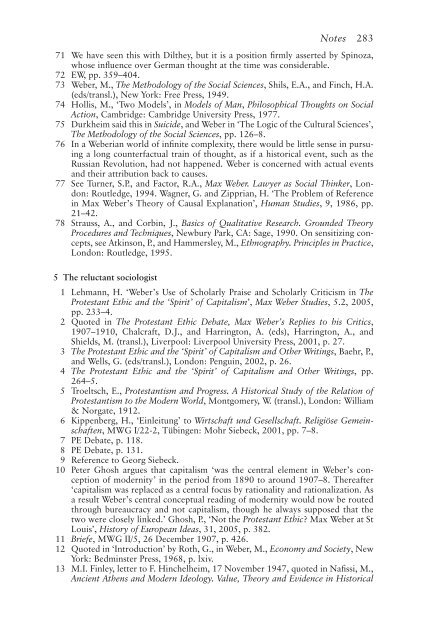Understanding Weber
Understanding Weber
Understanding Weber
Create successful ePaper yourself
Turn your PDF publications into a flip-book with our unique Google optimized e-Paper software.
Notes 283<br />
71 We have seen this with Dilthey, but it is a position firmly asserted by Spinoza,<br />
whose influence over German thought at the time was considerable.<br />
72 EW, pp. 359–404.<br />
73 <strong>Weber</strong>, M., The Methodology of the Social Sciences, Shils, E.A., and Finch, H.A.<br />
(eds/transl.), New York: Free Press, 1949.<br />
74 Hollis, M., ‘Two Models’, in Models of Man, Philosophical Thoughts on Social<br />
Action, Cambridge: Cambridge University Press, 1977.<br />
75 Durkheim said this in Suicide, and <strong>Weber</strong> in ‘The Logic of the Cultural Sciences’,<br />
The Methodology of the Social Sciences, pp. 126–8.<br />
76 In a <strong>Weber</strong>ian world of infinite complexity, there would be little sense in pursuing<br />
a long counterfactual train of thought, as if a historical event, such as the<br />
Russian Revolution, had not happened. <strong>Weber</strong> is concerned with actual events<br />
and their attribution back to causes.<br />
77 See Turner, S.P., and Factor, R.A., Max <strong>Weber</strong>. Lawyer as Social Thinker, London:<br />
Routledge, 1994. Wagner, G. and Zipprian, H. ‘The Problem of Reference<br />
in Max <strong>Weber</strong>’s Theory of Causal Explanation’, Human Studies, 9, 1986, pp.<br />
21–42.<br />
78 Strauss, A., and Corbin, J., Basics of Qualitative Research. Grounded Theory<br />
Procedures and Techniques, Newbury Park, CA: Sage, 1990. On sensitizing concepts,<br />
see Atkinson, P., and Hammersley, M., Ethnography. Principles in Practice,<br />
London: Routledge, 1995.<br />
5 The reluctant sociologist<br />
1 Lehmann, H. ‘<strong>Weber</strong>’s Use of Scholarly Praise and Scholarly Criticism in The<br />
Protestant Ethic and the ‘Spirit’ of Capitalism’, Max <strong>Weber</strong> Studies, 5.2, 2005,<br />
pp. 233–4.<br />
2 Quoted in The Protestant Ethic Debate, Max <strong>Weber</strong>’s Replies to his Critics,<br />
1907–1910, Chalcraft, D.J., and Harrington, A. (eds), Harrington, A., and<br />
Shields, M. (transl.), Liverpool: Liverpool University Press, 2001, p. 27.<br />
3 The Protestant Ethic and the ‘Spirit’ of Capitalism and Other Writings, Baehr, P.,<br />
and Wells, G. (eds/transl.), London: Penguin, 2002, p. 26.<br />
4 The Protestant Ethic and the ‘Spirit’ of Capitalism and Other Writings, pp.<br />
264–5.<br />
5 Troeltsch, E., Protestantism and Progress. A Historical Study of the Relation of<br />
Protestantism to the Modern World, Montgomery, W. (transl.), London: William<br />
& Norgate, 1912.<br />
6 Kippenberg, H., ‘Einleitung’ to Wirtschaft und Gesellschaft. Religiöse Gemeinschaften,<br />
MWG I/22-2, Tübingen: Mohr Siebeck, 2001, pp. 7–8.<br />
7 PE Debate, p. 118.<br />
8 PE Debate, p. 131.<br />
9 Reference to Georg Siebeck.<br />
10 Peter Ghosh argues that capitalism ‘was the central element in <strong>Weber</strong>’s conception<br />
of modernity’ in the period from 1890 to around 1907–8. Thereafter<br />
‘capitalism was replaced as a central focus by rationality and rationalization. As<br />
a result <strong>Weber</strong>’s central conceptual reading of modernity would now be routed<br />
through bureaucracy and not capitalism, though he always supposed that the<br />
two were closely linked.’ Ghosh, P., ‘Not the Protestant Ethic? Max <strong>Weber</strong> at St<br />
Louis’, History of European Ideas, 31, 2005, p. 382.<br />
11 Briefe, MWG II/5, 26 December 1907, p. 426.<br />
12 Quoted in ‘Introduction’ by Roth, G., in <strong>Weber</strong>, M., Economy and Society, New<br />
York: Bedminster Press, 1968, p. lxiv.<br />
13 M.I. Finley, letter to F. Hinchelheim, 17 November 1947, quoted in Nafissi, M.,<br />
Ancient Athens and Modern Ideology. Value, Theory and Evidence in Historical




